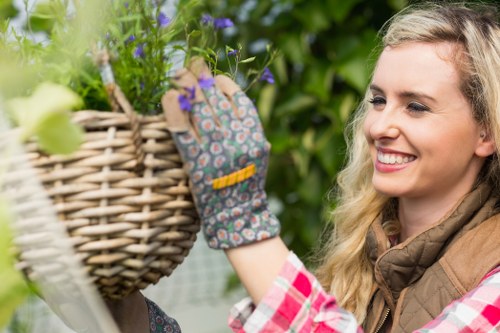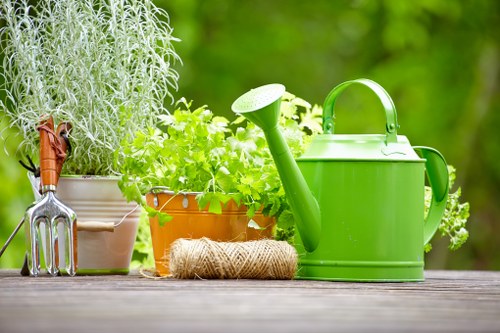Garden Fencing in Garden Maintenance
Introduction

Garden fencing plays a crucial role in maintaining the beauty and functionality of your outdoor space. It not only defines boundaries but also adds a layer of privacy, security, and aesthetic appeal. Whether you’re a seasoned gardener or a gardening enthusiast, understanding the significance of garden fencing can enhance your maintenance efforts and overall garden experience.
In this article, we will explore the various aspects of garden fencing, including its importance, different types, how to choose the right fence for your garden, installation and maintenance tips, and eco-friendly options. By the end of this guide, you'll have a comprehensive understanding of how garden fencing contributes to effective garden maintenance and how to select the best option for your specific needs.
Proper garden fencing can transform your garden into a well-organized, secure, and visually appealing space. It serves multiple purposes, from keeping unwanted animals out to providing a framework for climbing plants. Let’s delve deeper into the world of garden fencing and discover how it can elevate your garden maintenance practices.
Importance of Garden Fencing

Garden fencing is more than just a boundary marker; it serves several essential functions that contribute to the overall health and aesthetics of your garden. Here are some of the key reasons why garden fencing is important:
- Privacy and Security: A sturdy fence provides a sense of privacy, allowing you to enjoy your garden without external disturbances. It also acts as a security barrier, preventing intruders and protecting your plants from theft or vandalism.
- Defining Boundaries: Clear boundaries help in organizing your garden layout, ensuring that different sections are distinct and well-maintained. This is especially useful in larger gardens where different areas serve different purposes.
- Protection from Pests and Wildlife: Fences can keep out unwanted animals such as deer, rabbits, and other pests that may damage your plants. They act as a physical barrier, reducing the need for chemical pest control methods.
- Enhancing Aesthetics: A well-chosen fence can significantly enhance the visual appeal of your garden. It adds structure and can complement the overall design theme, making your garden more inviting and harmonious.
By understanding these benefits, you can make informed decisions about the type of fencing that best suits your garden’s needs. Now, let’s explore the various types of garden fencing available in the market.
Types of Garden Fencing

Choosing the right type of fence is crucial for effective garden maintenance. There are several options available, each with its own set of advantages and considerations. Here are some of the most popular types of garden fencing:
- Wooden Fences: Wooden fences are a classic choice, offering a natural and versatile look. They can be customized in various styles, such as picket, lattice, or solid panels, to match your garden’s aesthetic.
- Metal Fences: Metal fences, including wrought iron and aluminum, are known for their durability and strength. They provide excellent security and can be designed with intricate patterns to add elegance to your garden.
- Vinyl Fences: Vinyl fences are low-maintenance and resistant to weather conditions. They come in a variety of colors and styles, mimicking the appearance of wood without the upkeep.
- Chain-Link Fences: Chain-link fences are an affordable and practical option. They are particularly useful for larger gardens as they offer visibility while still providing a barrier.
- Composite Fences: Made from a blend of wood fibers and plastic, composite fences offer the appearance of wood with enhanced durability and resistance to rot and insects.
Each type of fence has its own set of benefits, so it’s essential to consider factors such as durability, maintenance requirements, aesthetics, and cost when making your choice. Next, we’ll discuss how to select the best fence for your garden.
Choosing the Right Fence for Your Garden

Selecting the appropriate garden fencing involves evaluating several factors to ensure that it meets your specific needs and complements your garden’s design. Here are some key considerations to help you choose the right fence:
Considering Climate and Durability
The climate in your region plays a significant role in determining the type of fence that will be most durable and effective. For instance:
- Wet Climates: In areas with high humidity or frequent rainfall, materials like vinyl or treated wood are preferable as they resist moisture and decay.
- Sunny Climates: UV-resistant materials such as aluminum or composite fences are ideal, as they can withstand intense sunlight without fading or deteriorating.
- Windy Areas: Strong and sturdy materials like metal or reinforced wood fences provide the necessary support to resist high winds.
Matching Garden Style and Design
Your garden’s style should influence your fencing choice to create a cohesive and harmonious look. Consider the following:
- Traditional Gardens: Wooden or wrought iron fences complement classic garden designs.
- Modern Gardens: Sleek materials like aluminum or minimalist vinyl fences align well with contemporary aesthetics.
- Rustic Gardens: Natural materials such as untreated wood or bamboo add to the rustic charm.
Budget Considerations
Fencing can vary widely in cost based on the material, design, and installation requirements. It’s essential to set a budget and explore options within that range. Keep in mind that while some materials may have a higher upfront cost, they could offer better longevity and lower maintenance costs over time.
By evaluating these factors, you can make an informed decision that balances functionality, aesthetics, and budget. Let’s now look into the installation and maintenance aspects of garden fencing.
Installation and Maintenance Tips

Proper installation and regular maintenance are critical for ensuring that your garden fence remains effective and visually appealing over time. Here are some tips to help you with both:
Proper Installation Techniques
Correct installation sets the foundation for a durable and functional fence. Here are some key steps:
- Planning and Measuring: Carefully measure your garden area to determine the required length and height of the fence. Planning helps in avoiding unnecessary expenses and ensures that the fence fits seamlessly into your garden layout.
- Foundation Preparation: Prepare the ground by removing obstacles and ensuring a level surface. For wooden fences, setting sturdy posts in concrete ensures stability.
- Alignment and Spacing: Ensure that fence panels are aligned correctly and evenly spaced. This contributes to a uniform appearance and structural integrity.
- Securing Panels: Use appropriate fasteners and hardware to secure fence panels. For metal fences, welding or using specialized connectors can provide added strength.
Regular Maintenance Practices
Maintaining your garden fence extends its lifespan and keeps it looking good. Consider the following maintenance practices:
- Cleaning: Regularly clean the fence to remove dirt, debris, and any stains. Different materials may require specific cleaning methods, such as using mild soap and water for wood or a hose for vinyl.
- Repairs: Inspect the fence periodically for any signs of damage, such as broken boards, rust, or loose fittings. Prompt repairs prevent minor issues from escalating.
- Painting and Staining: For wooden fences, applying paint or stain protects against weather damage and enhances appearance. Repainting every few years can keep the fence in top condition.
- Vegetation Control: Trim any plants or vines that may affect the fence’s structure. Overgrown vegetation can cause damage and reduce the fence’s effectiveness.
Common Fencing Issues and Solutions
Even with proper installation and maintenance, fences can encounter common issues. Here are some typical problems and their solutions:
- Rot and Decay: Wooden fences are susceptible to rot, especially in moist climates. Regular sealing and painting can prevent decay, and replacing damaged sections is essential.
- Rusting: Metal fences, particularly those made of iron, can rust over time. Applying a rust-resistant paint or treating the metal can slow down the rusting process.
- Warping and Sagging: Fences can warp due to moisture or improper installation. Ensuring proper drainage and using quality materials can minimize warping.
- Loose Fasteners: Vibration from wind or other factors can loosen screws and nails. Regularly tightening fasteners helps maintain the fence’s stability.
Addressing these issues promptly ensures that your garden fence remains functional and attractive. Up next, we’ll explore eco-friendly and sustainable fencing options.
Eco-Friendly and Sustainable Fencing Options

As environmental awareness grows, many gardeners are seeking eco-friendly and sustainable fencing options. These choices not only reduce your environmental footprint but also offer unique aesthetic benefits. Here are some sustainable fencing alternatives:
Recycled Materials
Using recycled materials for fencing is a great way to promote sustainability. Options include:
- Recycled Metal Fences: Made from recycled steel or aluminum, these fences offer durability and strength while minimizing resource use.
- Recycled Plastic Fences: These are eco-friendly alternatives to vinyl, often made from post-consumer plastic waste. They are durable, low-maintenance, and available in various styles.
Sustainable Wood Choices
If you prefer wooden fences, consider sustainable wood options to reduce environmental impact:
- Certified Sustainable Wood: Look for wood that is certified by organizations like the Forest Stewardship Council (FSC), ensuring that it comes from responsibly managed forests.
- Bamboo Fences: Bamboo is a highly renewable resource that grows quickly and offers a unique, natural look.
Living Fences
Living fences, made from plants and shrubs, provide a natural and environmentally friendly barrier. They offer several benefits:
- Eco-Friendly: Living fences absorb carbon dioxide and provide habitats for wildlife.
- Natural Aesthetics: They blend seamlessly with the garden environment and can be tailored to match the garden's design.
Reclaimed Materials
Using reclaimed materials, such as old doors, windows, or railway sleepers, can add a unique character to your garden fencing while promoting reuse and recycling.
Choosing eco-friendly fencing options not only benefits the environment but can also add distinctive features to your garden. Let’s conclude with a summary and a call-to-action to help you get started with your garden fencing project.
Conclusion

Garden fencing is an integral component of garden maintenance, offering a blend of functionality and aesthetics. From providing privacy and security to enhancing the visual appeal of your garden, the right fence can make a significant difference. By understanding the importance of garden fencing, exploring the various types available, and considering factors like climate, design, and sustainability, you can select a fencing solution that best suits your needs.
Proper installation and regular maintenance ensure that your fence remains durable and attractive over time. Additionally, opting for eco-friendly materials contributes to environmental preservation while adding unique elements to your garden space.
Investing in quality garden fencing not only protects your plants and property but also enhances the overall gardening experience. Whether you’re aiming for a traditional look or a modern design, there’s a fencing option that aligns with your vision and practical requirements.
Ready to transform your garden with the perfect fencing solution? Contact us today to explore our range of garden fencing options and book your service now. Let us help you create a beautiful, secure, and well-maintained garden space that you can enjoy for years to come.